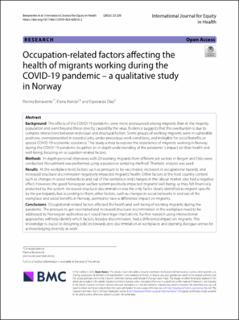| dc.contributor.author | Benavente Velando, Pierina Alexandra | |
| dc.contributor.author | Ronda, Elena | |
| dc.contributor.author | Diaz Perez, Esperanza | |
| dc.date.accessioned | 2024-03-19T13:37:53Z | |
| dc.date.available | 2024-03-19T13:37:53Z | |
| dc.date.created | 2023-11-02T09:44:41Z | |
| dc.date.issued | 2023 | |
| dc.identifier.issn | 1475-9276 | |
| dc.identifier.uri | https://hdl.handle.net/11250/3123156 | |
| dc.description.abstract | Background
The effects of the COVID-19 pandemic were more pronounced among migrants than in the majority population and went beyond those directly caused by the virus. Evidence suggests that this overburden is due to complex interactions between individual and structural factors. Some groups of working migrants were in vulnerable positions, overrepresented in essential jobs, under precarious work conditions, and ineligible for social benefits or special COVID-19 economic assistance. This study aimed to explore the experience of migrants working in Norway during the COVID-19 pandemic to gather an in-depth understanding of the pandemic´s impact on their health and well-being, focusing on occupation-related factors.
Methods
In-depth personal interviews with 20 working migrants from different job sectors in Bergen and Oslo were conducted. Recruitment was performed using a purposive sampling method. Thematic analysis was used.
Results
At the workplace level, factors such as pressure to be vaccinated, increased in occupational hazards, and increased structural discrimination negatively impacted migrants’ health. Other factors at the host country context, such as changes in social networks in and out of the workplace and changes in the labour market, also had a negative effect. However, the good Norwegian welfare system positively impacted migrants’ well-being, as they felt financially protected by the system. Increased structural discrimination was the only factor clearly identified as migrant-specific by the participants, but according to them, other factors, such as changes in social networks in and out of the workplace and social benefits in Norway, seemed to have a differential impact on migrants.
Conclusions
Occupational-related factors affected the health and well-being of working migrants during the pandemic. The pressure to get vaccinated and increased structural discrimination in the workplace need to be addressed by Norwegian authorities as it could have legal implications. Further research using intersectional approaches will help identify which factors, besides discrimination, had a differential impact on migrants. This knowledge is crucial to designing policies towards zero discrimination at workplaces and opening dialogue arenas for acknowledging diversity at work. | en_US |
| dc.language.iso | eng | en_US |
| dc.publisher | BMC | en_US |
| dc.rights | Navngivelse 4.0 Internasjonal | * |
| dc.rights.uri | http://creativecommons.org/licenses/by/4.0/deed.no | * |
| dc.title | Occupation-related factors affecting the health of migrants working during the COVID-19 pandemic – a qualitative study in Norway | en_US |
| dc.type | Journal article | en_US |
| dc.type | Peer reviewed | en_US |
| dc.description.version | publishedVersion | en_US |
| dc.rights.holder | Copyright 2023 The Author(s) | en_US |
| dc.source.articlenumber | 220 | en_US |
| cristin.ispublished | true | |
| cristin.fulltext | original | |
| cristin.qualitycode | 1 | |
| dc.identifier.doi | 10.1186/s12939-023-02013-2 | |
| dc.identifier.cristin | 2191344 | |
| dc.source.journal | International Journal for Equity in Health | en_US |
| dc.identifier.citation | International Journal for Equity in Health. 2023, 22 (1), 220. | en_US |
| dc.source.volume | 22 | en_US |
| dc.source.issue | 1 | en_US |

